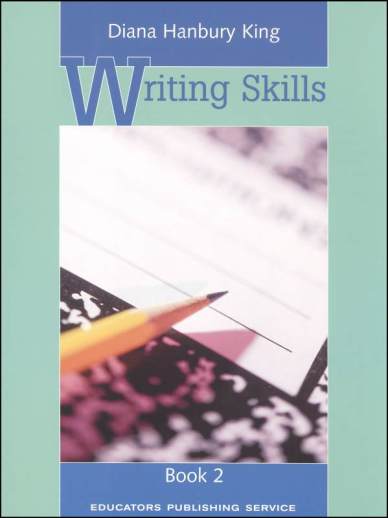These consumable student books teach expository writing from the ground up - from understanding words to constructing sentences, then writing organized paragraphs. Like building blocks, the students work on the foundational skills that pave the way for writing the five-paragraph essay. Some students take to writing naturally, but these books are for those who need more instruction and a specific writing method to follow. The activities provided in the workbooks give students lots of writing practice and cement writing techniques in their minds by making them use the skills in their own writing. Activities include writing sentences and deciding whether they are singular or plural, writing sentences or paragraphs using specific writing prompts, expanding paragraphs to include more details, outlining paragraphs, identifying writing elements in text that is provided, and much more. Book A begins with sentences. First, students practice the parts of speech in a sentence - subjects, different kinds of nouns, predicates, verbs, and more. Then they work with different types of sentences, from statements and exclamations to supporting sentences, topic sentences, and concluding sentences. Students delve into basic paragraphs, examining parts of speech such as adjectives and adverbs as well as practicing simple paragraphs and other short writing forms. By the end of book 1, your child will master writing four kinds of paragraphs: example, process, reason, and classification. Book 2 reviews these forms and adds two new types of writing (definition and compare-and-contrast), then explains how to use the same process learned in writing paragraphs to write the five paragraph essay. Book 3 provides practice in even more advanced writing, reviewing basic skills learned in the first books and then focusing more on expository writing. Eight types of exposition are practiced in a step-by-step fashion, along with additional practice with sentence skills. Different types of clauses are also covered and practiced in Book 3. The Teacher's Handbook is a comprehensive guide for use with all of the student books. It is not an answer key, rather it is a tool for the teacher to help guide students through the concepts covered in the student books. It includes clear explanations as well as models, exercises, and teaching strategies for struggling, beginning, and even advanced writers. The ten chapters in the handbook cover the sentence, the paragraph, types of writing, the essay, standards and assessments, proofreading and revising, working with groups, spelling, handwriting, and keyboarding. Helpful reproducibles are included. According to the publisher, these workbooks are not reproducible, but the activities could be completed on separate pieces of paper if you have more than one student. Between 110 and 140 pgs, pb.


